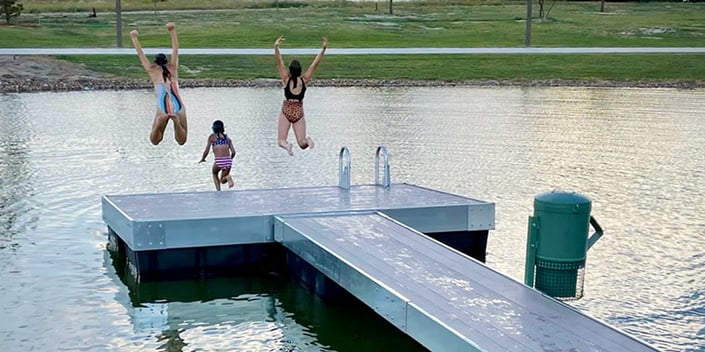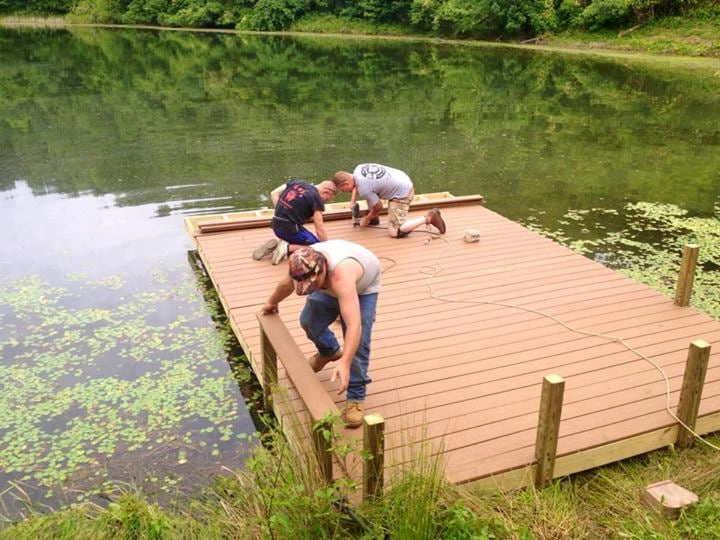Crafting Customized Solutions: Why a Floating Dock Builder is Important for Special Needs
Crafting Customized Solutions: Why a Floating Dock Builder is Important for Special Needs
Blog Article
Floating Docks: The Suitable Choice for Versatile Water Gain Access To
Floating docks present an engaging remedy for a selection of water access needs, offering convenience that transcends typical mooring alternatives. Their capability to adjust to rising and falling water degrees while guaranteeing security and safety makes them particularly advantageous for both commercial and recreational applications. The modular nature of floating docks helps with modification, providing to particular requirements. Nevertheless, the subtleties of setup and maintenance, together with the range of applications, necessitate a closer assessment to completely appreciate their prospective advantages and implications for river gain access to strategies.
Advantages of Floating Docks
Floating docks offer countless advantages that boost water access for different applications. Their capability to fall and increase with altering water degrees makes them especially advantageous in atmospheres with changing tides or seasonal variants. This versatility makes sure that vessels can quickly tie without issue for the water's deepness, supplying a trustworthy system for entertainment, industrial, and commercial uses.
Furthermore, floating docks are frequently constructed from durable products that stand up to rust, making them appropriate for long-term usage in aquatic settings. Their installment is generally much less invasive than typical set docks, reducing the ecological effect and assisting in quicker release (floating docks). This versatility permits easier relocation or reconfiguration according to individual demands or ecological changes
Safety is another vital advantage; floating docks can provide secure accessibility for people boarding or getting off from watercrafts and minimize the risk of crashes associated with unpredictable surface areas. They can be developed to suit a range of accessories, such as cleats and fenders, enhancing functionality. Generally, floating docks represent an efficient service for boosting water access throughout varied industries while promoting safety and ecological sustainability.

Kinds Of Floating Docks
Different types of floating docks deal with various demands and atmospheres, each created with particular attributes to enhance performance. The most common kinds include modular docks, which are composed of interlocking areas that permit very easy personalization and development. These docks are suitable for recreational use, as they can be tailored to fit numerous boat sizes and water conditions.
An additional popular option is the stationary floating dock, which continues to be anchored in location yet floats with changing water levels. floating dock builder. This kind is specifically suited for areas with very little tidal changes, providing stable access for angling or swimming. Furthermore, there are drive-on docks, which feature a sloped design that allows watercrafts to conveniently drive on and off, making them ideal for personal boat and smaller sized vessels
For business applications, heavy-duty floating docks are offered, created from reinforced materials to withstand considerable tons and severe aquatic settings. Lastly, environmentally friendly floating docks make use of lasting products and layouts to decrease ecological effect, often incorporating attributes like plant life to sustain neighborhood wild animals. Comprehending the different sorts of floating docks makes certain that individuals can choose the most appropriate solution for their details needs.
Setup Process Introduction
A successful installation of floating docks needs careful planning and interest to detail to make sure optimum efficiency and safety. The first action entails evaluating the site conditions, consisting of water depth, existing, and prospective obstacles. This analysis informs the option of the suitable dock products and style customized to the certain environment.
Following, obtaining essential licenses is crucial, as many territories have regulations pertaining to building on water bodies. Once approvals are protected, the installment can proceed. Begin by preparing the foundation, which might entail anchoring systems or pilings tailored to the dock kind and neighborhood floating dock services conditions.
Following the foundation configuration, put together the dock sections according to manufacturer specs. Ensure that all parts are safely secured and lined up to hold up against ecological stress and anxieties. Placement the dock in the assigned area, ensuring it is degree and stable.

Maintenance Tips and Finest Practices
After the setup process is complete, ongoing upkeep plays an essential duty in making certain the long life and performance of floating docks. Routine evaluations should be conducted to recognize any type of indications of damages, degeneration, or wear - floating dock services. Look for any loosened fittings, splits, or splitting up in the dock sections, as these can endanger structural integrity
Cleansing the dock Homepage is vital to remove particles, algae, and other accumulation that can impact its look and safety and security. Use a mild pressure clean regularly to maintain sanitation without causing damages to the surface. Additionally, using a protective sealer every couple of years can help enhance durability and resist ecological wear.
Take note of the mooring lines and anchors, guaranteeing they are complimentary and secure from deterioration. Replace any type of degraded parts quickly to avoid dangers. Seasonal adjustments might also be needed; throughout extreme climate condition, strengthening the dock or repositioning can protect against damage.
Applications for Floating Docks
Floating docks serve a wide variety of applications, satisfying both commercial and leisure needs. In recreational setups, they supply seamless access to waterways for activities such as boating, angling, and swimming. Their adjustable nature enables setup in varying water degrees, making sure steady and secure accessibility no matter tidal fluctuations.
Commercially, floating docks are indispensable for marinas and waterside services. They promote the docking of vessels, enabling efficient loading and unloading of goods. Their modular design allows for easy expansion or reconfiguration to accommodate changing business demands, making them perfect for boat rentals, tour operations, or angling charters.
In addition, floating docks are used in environmental applications such as aquatic research study and habitat remediation. They can work as platforms for clinical research studies, checking water top quality, or carrying out wildlife surveys without disturbing sensitive communities.
In industrial contexts, floating docks are used in building jobs, offering accessibility to hard-to-reach areas for devices and personnel. Their versatility, resilience, and minimal influence on the atmosphere make them an optimal choice for a large range of applications, boosting both performance and ease of access in various water-based environments.
Verdict
In verdict, floating docks represent an optimal remedy for diverse water access requires, owing to their versatility, sturdiness, and modular design. These structures promote secure mooring for different applications while reducing ecological effect throughout setup. The reduced upkeep requirements better improve their practicality. Floating docks serve as a useful asset for entertainment, commercial, and ecological jobs, making certain reputable accessibility to waterways and promoting lasting techniques in marine atmospheres.
Floating docks existing an engaging remedy for a selection of water access needs, offering versatility that transcends traditional mooring options.Floating docks deal countless benefits that boost water accessibility for numerous applications. On the whole, floating docks stand for an efficient option for enhancing water gain access to across diverse sectors while promoting safety and security and ecological sustainability.
Another preferred alternative is the fixed floating dock, which remains anchored in place but drifts with transforming water degrees.In verdict, floating docks stand for an ideal option for diverse water access requires, owing to their adaptability, this hyperlink durability, and modular design.
Report this page